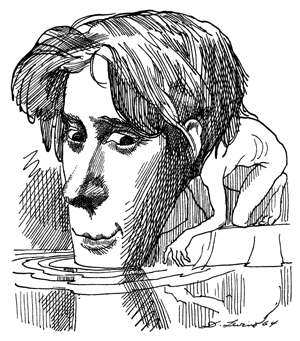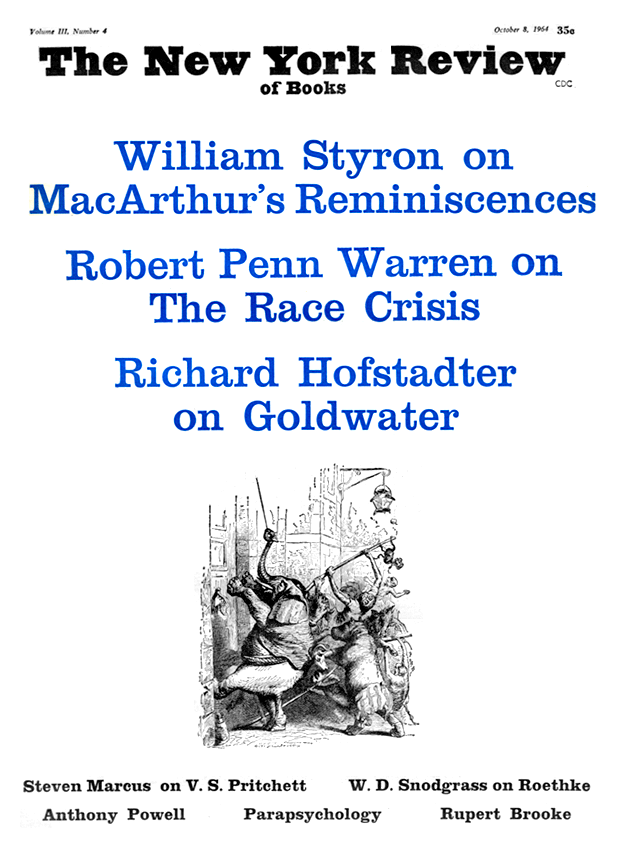Honour has come back, as a king, to earth,
And paid his subjects with a royal wage;
And Nobleness walks in our ways again;
And we have come into our heri- tage,
—The Dead I.
Four years after the young poet died, a genial party gathered at his old house in Rugby to celebrate his memory. The terrible war was over; the poet’s general, a bit of a literary man himself, was in excellent form. The poet’s mother invited one of her son’s best Cambridge friends to carve the chicken; “she really did thoroughly enjoy having a houseful,” and afterwards was hostess to several hundred further guests for tea. The general unveiled a highly spiritual plaque of the poet, showing him bare-shouldered and with a misleadingly epicene expression, and said: “Like a prince he would enter a room, like a prince quite unconscious of his own royalty, and by that mere act put a spell upon everyone around him.” Twelve years later, the poet’s first book of verse had sold nearly a hundred thousand copies.
The wage certainly was royal. Yet many, and perhaps most, of those who asembled at Rugby in 1919 knew that the “heritage” which the British had so willingly accepted from Rupert Brooke involved a hopeless misconception of what Brooke had really thought and been, and the best of them persisted in pointing this out. They were hardly heeded. There had to be some meaning, some virtue, in the four-year disaster which had just taken place, and Brooke, in his last untypical sonnets, had grasped at a meaning:
…the rich Dead!
There’s none of these so lonely and poor of old,
But, dying, has made us rarer gifts than gold…
Mr. Hassall, in this biography, does not mock the need for consolation which made Brooke into something like an English Petöfi, his verse perhaps even now more commonly known than that of any poet but Shakespeare. Thousands found reason in Brooke to hope that the great failure had somehow been a success after all; men like Winston Churchill rendered solemn thanks that a poet should have come to share their view of war’s ennobling properties. The patriotic myth grew, “man into marble,” as Mr. Hassall puts it. When the ultimate reaction came, revulsion buried the true Brooke coffined inside the false.
In a way, the public was right about the verse. Tremendous fads for something new often turn out to be revivals, and Brooke’s readers correctly identified in his poetry elements which he would hardly have acknowledged: agnostic and socialist as he was, he constantly used religious categories—“God” and “Heaven” and an immortal soul—to express familiar Christian oppositions of carnal impurity to the “cleanliness” of self-denial. His language still held echoes of Hymns Ancient & Modern, his tastes outraged nobody’s prejudices, the “England” of his verse was the fabulous Eden of a million dimly remembered childhoods. There was nothing to shock, beyond some jolly, scatological things. His biographer repeats that Brooke, who thought of himself as the beginning of something new in poetry, must now be seen as the end of something old.
Those who had known Brooke could never accept this of him personally. In life, he had been a vigorous, cheerful young man, both iconoclastic and practical. Virginia Woolf “thought he would be Prime Minister, because he had such a gift with people, and such sanity and force…my idea was that he was to be a member of Parliament and edit the classics, a very powerful, ambitious man, but not a poet.” E. M. Forster took the same view; Brooke, he thought, would have become a “live wire in public affairs and an energetic and enlightened administrator,” rather than a better poet. He was a Fabian, and deeply involved in political work, organizing, speaking, and encouraging. His socialism was authentically English, of the decent, moralizing, give-the-people-air kind which still dominates the Labour Party. Perhaps, indeed, he would have done well as a consciously “socialist poet”; his friend Hugh Dalton, we learn, used to quote:
Yet, behind the night,
Waits for the great unborn, some- where afar.
Some white tremendous daybreak
in his political speeches. Brooke’s extravagance with strong, vague epithets pays off in politics, becoming a sort of poster art.
Mr. Hassall’s biography is immensely long, at times absurdly detailed in its descriptions of Brooke’s schooldays at Rugby or his acquaintances, at times suspiciously curt, as if something known to the select few is being swept under the carpet. The detail has its functions, if you want to reconstruct an intimacy with the Cambridge generation of ’06, its “aesthetic, Bedalian, Fabian and Bloomsbury” elements. The curtness is especially disappointing. Mr. Hassall has shown that Brooke’s short adult life was filled up and shaped by crises with women, but—one may be wrong—he leaves a feeling that a good deal more than what he discloses, ample as it is, must have taken place to produce such an emotional earthquake.
Advertisement
For under the pressure, Brooke’s whole interpretation of life and his own chances in life turned upside down. It was not merely and trivially that he quarreled with Bloomsbury and cut Lytton Strachey dead in a theater, considering him an evil influence. It was a loss of faith in free will itself. By the age of twenty-seven, when he died, Rupert Brooke had changed from a ribald leader of the anti-Victorian attack into a sacrificial fatalist to whom war offered regeneration. The mass of correspondence which Mr. Hassall prints provides evidence. In 1910, Gwen Darwin writes to him and speaks of her possible marriage, describing her sense of being driven on by an external force. He retorts with Cambridge scorn: “External Power? What? God? The Life-Force? Oh, my Gwen, be clean, be clean! It is a monstrosity. There is no power. Things happen, and we pick our way among them…It wildly embraces life when one realizes one’s free-will…” But by 1912, he was comparing his power of decision to a river which cannot choose where it shall run into the sea, and the following year praising Strindberg for teaching that men were unconsciously driven by a power infinitely greater than themselves.
Brooke’s first love was Noel Olivier, a girl of fifteen. She was too young to be approachable, and Brooke became gradually entangled with Ka Cox, one of the close group which formed around him at Cambridge. Admittedly a very young man in an unsophisticated age, Brooke failed utterly to sort out love from jealousy, sexual timidity, and the wish to be mothered. He tortured himself over the choice between Noel and Ka Cox, without asking himself whether he might not be using Noel as a mere refuge from sexual commitment, and broke down completely when he discovered that Ka was taking a fancy to a Bloomsbury painter whose views of chastity were less intense than his. Then he began a painful Robin-and-Makyn comedy. Recuperating in Cannes, he lashed himself up into a state of artificial passion for Ka, persuaded the muddled girl to go off with him, and then collapsed once more when she confessed that, in spite of allowing herself to become Brooke’s mistress, she still preferred the painter. In this crisis, Brooke turned bitterly against feminism, which he came to regard as an obscene Bloomsbury doctrine corrupting the femaleness of decent girls. He acquired the view that he, the chaste idealist, was the victim of a sexual plot, and began to talk about the “great evil” which poor Miss Cox had done him. This was the more unfair, in that Ka Cox had now discovered that after all she did love Brooke more than the painter, and—used to taking those she admired at their word—simply would not believe that Brooke had in his turn now fallen out of love.
Brooke went away, toured the United States and Canada, and settled briefly in Tahiti, where a girl called Taatamata made things a good deal better. Then the war came, and there was danger, purpose, regimental life, the spiritual prescription for which so few middle-class Englishmen have yet found a substitute. Brooke was happy, and wrote many poems. “I had hopes that England’ld get on her legs again, achieve youth and merriment, and slough the things I loathe—capitalism and feminism and hermaphroditism and the rest.” He died of septicaemia on a hospital ship off Skyros, in April 1915, a beautiful, robust, even comical young man and a clever minor poet. What happened to his name and verse after his death was not his fault. His writing and opinions were suddenly frozen when, so Mr. Hassall puts it, he was “preoccupied with what we would be able to call a passing phase, had he not himself passed with it…”
This Issue
October 8, 1964



